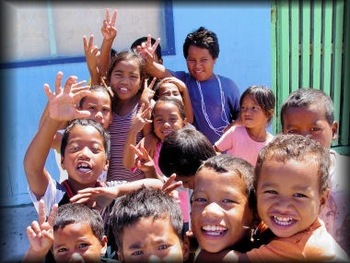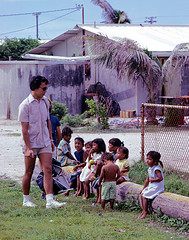
National Training Council – Marshall Islands
Add a review FollowOverview
-
Founded Date April 30, 1974
-
Sectors Assistance in the preparation of meals
-
Posted Jobs 0
-
Viewed 133
Company Description
National Training Council – Marshall Islands

RMI Education and Skills Strengthening Project
The Government of the Republic of Marshall Islands has received financing from the World Bank for the Education and Skills Strengthening Project (ESSP) cost. It plans to use part of the proceeds for speaking with services.
The consulting services (« the Services ») will assist the Project Manager and the RMI National Training Council in executing the World Bank-funded task effectively.

The task will concentrate on supporting the Project Implementation Unit (PIU) in producing a framework for Recognition of Prior Learning (RPL) for TVET, aimed at helping the College of the Marshall Islands and the rmi national training council National Training Council evaluate and enhance the skills of workers through certified college certification.
The in-depth Terms of Reference (TOR) for the project are shown in the connected Terms of Reference (ToR).
The National Training Council now welcomes qualified individuals (« Consultants ») to indicate their interest in offering the Services. Interested Consultants should supply details demonstrating that they have actually the required certifications and appropriate experience to carry out the Services (connect a Cover Letter of no more than four (4) pages dealing with the mandatory experience and qualification requirements curriculum vitae with a description of experience in similar tasks, comparable conditions, etc). Companies’ personnel might express interest through the using company for the task. In such a situation, just the experience and credentials of people will be considered in the choice process. The criteria for electing the Consultant are: A.
Mandatory Qualifications and Experience Master’s degree in education, training
, management, or a related field. Minimum of 5-10 years of experience working in TVET System. Curriculum Design and Systems.
Have 2-5 years’ experience developing and
implementing RPL. frameworks, policies, and procedures. A sample of previous work will be required as evidence of previous experience. Exceptional interaction, training, and assistance
abilities. Experience with working with varied stakeholders, including federal government. agencies, TVET institutions, companies, and students in the Pacific. B. Desired Qualifications and Experience Capability to deal sensitively in a multicultural
environment and build efficient group relationships with customers and appropriate stakeholders. The attention of interested Consultants (including companies )is drawn to paragraphs 3.14, 3.16 and 3.17 of the World Bank’s »
Procurement Regulations for IPF Borrowers « July 2016 modified November 2020 » Procurement Regulations « , setting forth the World Bank’s policy on conflict of interest. Further information can be gotten at the address below throughout office hours, 0900 to 1700 local time. Expressions of interest need to be
provided in a written kind to the address listed below (in person or by email )by 5:00 pm, 23rd December 2024.
The subject line should state: »National Training Council Strategic Plan Consultant -complete name of the candidate ». Julius Lucky Director National Training Council!.?.!ntcdr@ntcinfo.org:Phone: 692 625-4521 Empowering Community Champions for Sustainable Development in RMI Gender Equality, Climate Resilience and Water Safety Training Majuro,
Republic of the Marshall Islands: The fourth
Women and Youth Training for
Gender Equality, Climate Change, Disaster Risk Reduction and Water Safety Management has recently taken place at the University of the South Pacific’s school in Majuro, the Republic of the Marshall Islands(RMI ). This essential training was arranged by the United Nations Development Programme( UNDP )Pacific Office through the Addressing Climate Vulnerability in the Water Sector(ACWA) task. The week-long capacity-building training aimed to empower ladies and youth with the understanding and practices needed for climate-resilient water safety management in the
Republic of the Marshall Islands(RMI ). This training strengthens a commitment to boosting rmi national training council‘s water security and neighborhood strength versus climate change effects, especially females
and youth, making sure that nobody is left. The training invited individuals from all 24 atolls and featured resource speakers from government firms, non-governmental companies, and international advancement partners from the RMI Environmental Protection Authority, Climate Change Directorate, Office of the Chief Secretary, Ministry of Culture and Internal Affairs, National Disaster Management Office, Women United Together Marshall Islands, RMI Human Trafficking Task Force, Waan Aelõñ in Majel, Jo-Jikum, and the International Organization for Migration. In her opening remarks, Secretary for the Ministry of Culture and Internal Affairs, Brenda Alik, underscored the significance of collective action in building a climate-resilient nation. »It is our duty to come together and interact. As we deal with the challenges postured by climate change, understanding its influence on our water resources is necessary for enhancing the well-being of communities throughout the Marshall Islands, »she said.
RMI Environmental Protection Authority General Manager Moriana Philip highlighted in her speech the essential role of women and youth in dealing with climate-related challenges. »This workshop unifies us from various communities to resolve the pressing concerns we deal with today, consisting of climate-related challenges, particularly on our water resources. »We want to stress the crucial function of ladies and youth in this project as your involvement contributes to its success and beyond, « she stated.
The first day of the workshop covered critical issues connected to gender equality, human rights, and public health within the Marshall Islands. It consisted of discussions on gender equality and mainstreaming, focusing on the effects of environment change on water security and the out of proportion impacts on vulnerable groups. The value of integrating gender equality and social inclusion into all task aspects was likewise gone over. Human rights and human trafficking were tackled, worrying the need for thorough security of vulnerable populations

throughout emergency situations. In addition, the workshop resolved gender-based violence, highlighting the various types that can emerge in disaster circumstances, such as domestic violence and sexual coercion. The program concluded with a focus on sanitation and health and their important role in health, incomes, school presence, dignity, and structure resilient neighborhoods. ACWA Project Manager Koji Kumamaru revealed his thankfulness to all participants
, highlighting the importance of their contributions to their neighborhoods. »Women and youth are essential to the success of the ACWA task. More notably, you are the champions and future leaders who will go back to your neighborhoods to empower others, »he said. Throughout the workshop, individuals visited Rongrong Island and took a look at the 15,000-gallon Flatpack Modular water tank set up at the Rongrong High School Boys Dormitory as part of the ACWA task. The installation is a crucial component of the job, complemented by assistance from Australia
‘s Department of Foreign Affairs and Trade. The see acted as a valuable firsthand experience of the positive effect of the ACWA project on the community and its

water resources. Marie Naisher from Jabat Island revealed her thankfulness for the chance to sign up with the workshop and made clear her desire to be part of the task when it reaches Jabat.
« This was my first time participating in such training, and I learned a lot from the guest speakers, group activities, and the website check out. I now understand the importance of tidy water and how to sterilize it. I’m ecstatic about the ACWA project coming to Jabat and prepared to assist when it shows up, »she stated. Don Kobney, an ACWA site coordinator from Santo, Kwajalein, likewise shared his enjoyment. »The workshop and website visit improved my confidence and understanding of the water tank installation.
Seeing the 15,000-gallon flatpack modular water tank firsthand gave me a clear understanding of the system, and I’m eagerly anticipating sharing this knowledge with my neighborhood, « he stated. By the workshop’s end, individuals were better equipped to understand climate modification and its regional impacts, drive adaptation and mitigation efforts, especially in water safety, and use brand-new resources to affect their communities favorably. ACWA is enabled thanks to the support of the Green Climate
Fund, with the project co-financed by the Government of the Republic of the Marshall Islands
. The Marshall Islands: Skills Training and Vocational Education Project Examines the efficiency of the project and highlights lessons. Supplies inputs to two more comprehensive evaluations- the local evaluation of ADB assistance for the Pacific and the special examination research study on Millennium Development Goals. The low educational attainment and shortage of Marshallese skilled workers were mainly due to the low quality of fundamental education, lack of access to education in the external islands, and weaknesses in skills training and the vocational and technical education system.
These supported an economy marked by high joblessness because of constrained private sector development and federal government downsizing. Unemployment was particularly high among the youth and ladies in the outer islands. Ideal local proficient workers for existing task vacancies
were unavailable, for this reason the importation of appropriately competent foreign employees. Thus, there was an inequality in between available tasks and abilities of the Marshallese labour force. These conditions offered the effort for the Government
of the Marshall Islands to prioritize technical and employment education training reforms. In 2000, ADB approved a loan for $9.1 million to enhance abilities training to provide well-trained employees required for continual financial and social advancement. This was to be accomplished through an integrated national skills training system. The task consisted of four parts: development of a profession awareness program, abilities training enhancement, boosted abilities training opportunities for ladies and youth, and institutional fortifying. The anticipated result was increased income-generating chances and employment for trainees, especially women and youth in the outer islands. Overall, the job was rated unsuccessful. Limited development was achieved in making the job responsive to the requirements of its recipients and private-sector companies. The enduring weak point of bad numeracy and literacy proficiencies
amongst public primary and secondary school graduates and dropouts entering college or participating in voc-tech education could be partly credited to the poor quality of standard education. The project was supply-driven and could not establish a strong linkage with economic sector requirements or align its activities with the requirements of the labour market. The status of the technical and occupation education training system has stayed fundamentally the same after project conclusion. The study advanced that ADB might motivate the Government of the Marshall Islands, through assessment and policy dialogue, to follow through on the federal government’s
dedication to developing a committed labour information system to link technical and occupation education training program offerings with market demand. Although the job set up a labour market information system, in the absence of internal staff capability at the National Training Council, it was not fully operational.